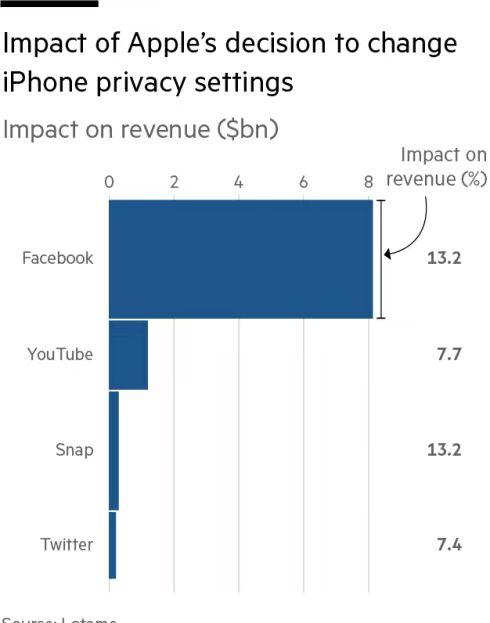Studies estimate that snap, Facebook, Twitter and YouTube, four tech platforms that offer advertising services, have lost nearly $10 billion since Apple adjusted its iPhone privacy policies.
In April, Apple launched App Tracking Transparency in the iPhone, which requires apps to obtain user permission before tracking user behavior and providing personalized advertising, which has had a huge impact on major social media platforms.
According to the study, most iPhone users choose not to let apps track their behavior, leaving advertisers confused about how to track users. The advertising businesses of Snap, Facebook, Twitter and YouTube were all hit by Apple's new privacy rules, and the four companies lost about $9.85 billion in revenue in the second half of the year.
Sheryl Sandberg, Facebook's chief operating officer, has said the changes to the iPhone's privacy policy mean "the accuracy with which our ads target users has decreased, which has increased the cost of customer acquisition for advertisers." And...... Measuring ad performance becomes more difficult. ”
Ad-tech company Lotame estimates that the four tech platforms lost a combined 12 percent of revenue, or $9.85 billion, in the third and fourth quarters. Snap has the largest proportion of losses because it focuses on the smartphone business; Facebook, on the other hand, suffered the most absolute losses because of its size.
Mike Woosley, Lotame's chief operating officer, said advertisers are now making less money on the iPhone channel. He gave an example of how a men's lingerie brand could acquire a customer for $5 to target 1,000 men.
"Now, if you want to find 1,000 men, you have to show ads to 2,000 users," Wolseley said. This is because all of a sudden, you don't know who is a man and who is a woman. "And advertisers still spend only $5 on 2,000 impressions, but they actually double the cost of customer acquisition and lose 50 percent of their gains."
Aidan Corbett, CEO of Wayflyer, which finances online shopping businesses, said Facebook suffered the most losses in this case, with the cost of running ads on its platform rising for years.
"If you're no longer running ads on Facebook, you're going to leave immediately," he said. "So TikTok has become very popular because at the cost per 1,000 impressions, it's much cheaper."
Charles Manning, CEO of Kochava, which measures the effectiveness of mobile marketing, said the idea that ad spend is actually declining is wrong. "Consumption is not decreasing, it is only increasing," he said. "Where marketers spend more money is where they want to see results."

Pictured: The impact of Apple's iPhone app tracking transparency mechanism on the revenue of four technology platforms
Apple adjusted its privacy policy at the end of April, and it wasn't until mid-June that the number of users who refused to track reached its maximum. Snap seems caught off guard by the slow changes that apple's privacy policy changes have brought about.
Jeremi Gorman, Snap's chief commercial officer, said in her October 21 earnings release that while the "preliminary results" looked good, "over time" she realized that Apple's new advertising metrics system "has become unreliable as an independent measurement tool."
The next day Snap shares fell 27 percent, wiping out more than $30 billion in market value. Analysts at investment bank RBC said the company's credibility "may no longer exist" and that "management's performance in dealing with the impact of this matter sounds simply terrible."
Lotame's estimates are likely to be conservative. Eric Seufert, an ad-tech consultant, said Facebook alone could lose $8.3 billion in the second half of the year due to Apple's privacy policy tweaks. He believes that as the entire advertising field is rebuilt according to user privacy, the resulting revenue loss will continue into the next quarter.
"In particular, some advertising platforms such as Facebook are the most affected," he said. Because the application tracked the impact of transparency mechanisms, they had to rebuild their system from scratch. "I think it will take at least a year to build new infrastructure." New tools and frameworks need to be developed from scratch and extensively tested before being used by a large number of users. ”
David Wehner, Facebook's chief financial officer, called the impact of Apple's privacy policy tweaks "challenging" and "more damaging than we expected."
In contrast, both Alphabet and Twitter described the impact of Apple's privacy policy adjustments as "modest." Twitter's advertising revenue increased 41% year-over-year in the last quarter. The company said Apple's privacy policy tweaks have had less of an impact on it because ads on Twitter rely more on context and brand than on tracking consumer habits.
Alphabet has enough first-hand user data and doesn't need to track users through third-party apps. While YouTube is an exception, Alphabet Chief Financial Officer Ruth Porat said Apple's privacy policy tweaks have limited impact on YouTube.
Meanwhile, Apple's latest earnings report released on Thursday showed that the advertising business hit a new quarterly high. Corporate Services revenue exceeded expectations of $700 million to reach $18.3 billion.
Luca Maestri, Apple's chief financial officer, said: "The advertising industry, like other industries, is a growing industry. "We think we have an opportunity to continue to grow over time."
"A lot of people think that Apple has created a lot of windfall for itself, and the rhetoric is very hypocritical. In fact, none of this is selfless," said Cory Munchbach, chief operating officer of blueConic, a customer data platform. "Apple has done a great job of promoting how to protect user privacy issues. But if there is no interest, they will not do it. ”
Asked about this on an analyst earnings call on Thursday, Apple CEO Tim Cook said: "We strongly believe that privacy is a fundamental right of users. That is our motivation. There is no other motive. ”